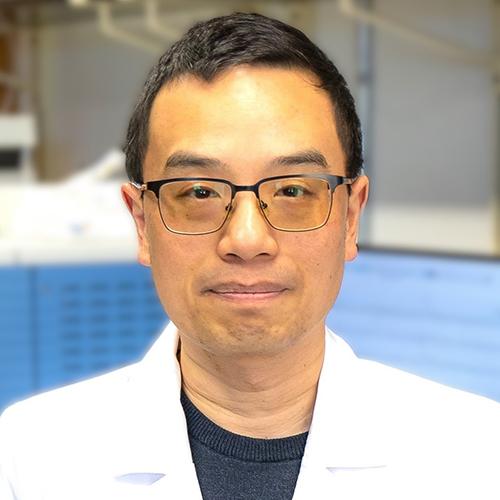
Associate Professor of Chemical Biology & Medicinal Chemistry
Our research focuses on microbe-derived natural product-based drug discovery. Natural products are specialized metabolites produced by living organisms such as microbes. With evolutionarily optimized chemical structures and intrinsic biological activities, natural products continue to be one of the most important sources for drug discovery, as exemplified by the first true antibiotic penicillin and a first-line anticancer drug doxorubicin among many other clinically used drugs.
Microbes harbor biosynthetic genes to encode enzymes that catalyze various chemical reactions to generate unique molecules. The chemical diversity and biological activity of these small molecules is virtually limitless by virtue of the abundant microbial biodiversity and continued evolution that they can access. We focus on translating this vast chemical and biological potential into opportunities for drug discovery. Our research approach is based on the opportunities that 1) a large number of unique microbial small molecules still await discovery, especially from underexplored microorganisms; 2) the exponential growth in microbial (meta)genomic data can facilitate the rapid identification of the biosynthetic genes that encode small molecules; and 3) harnessing these biosynthetic genes can enable the construction of small molecules in the laboratory.
We are particularly interested in small molecules produced by human microbiota, a community of microbes that live in and on human bodies. These microbes have evolved a symbiotic relationship with humans, and their metabolites directly interact with human cells, leading to intrinsic and profound impacts on human health. We integrate multidisciplinary approaches, including informatics, metabolomics, and biochemistry, to discover these specialized metabolites and elucidate their functions in human health.
Xue, D.; Zou, H.; Qiu, Y.; Lv, W.; Madden, M. D.; Lian, X.; Xu, M.; Pulliam, C.; Older, E. A.; Campbell, A.; der Rond, T.; Awakawa, T.; Yuan, C.; Moore, B. S.; Li, J. Discovery of acylsulfenic acid-featuring natural product sulfenicin and characterization of its biosynthesis. Nature Chemistry, 2025, DOI: 10.1038/s41557-025-01833-9
Older, E. A.; Mitchell, M.; Campbell, A.; Lian, X.; Madden, M.; Wang, Y.; VanderVeen, B.; Tatum, R.; Murphy, E. A.; Chen, Y.; Fan, D.; Ellermann, M.; Li, J. Human gut commensal Alistipes timonensis modulates the host lipidome and delivers anti-inflammatory outer membrane vesicles to suppress colitis in an Il10-deficient mouse model. Gut Microbes, 2025, 17(1), DOI: 10.1080/19490976.2025.2517380.
Xue, D.; Wu, Q.; Hou L.; Pulliam, C.; Xu, M.; Madden, M. D.; Madu, J.; Li, Y.; Liu, S.; Fan, D.; Bugni, T. S.; Wang, T.; Li, J. Discovery and biosynthetic interrogation of a cobalt-containing terpene-polyketide-nonribosomal peptide tribrid with anticoronavirus activity. Journal of the American Chemical Society, 2025, DOI: 10.1021/jacs.5c16450.
Older, E. A.; Zhang, J.; Ferris, Z. E.; Xue, D.; Zhong, Z.; Mitchell, M.; Madden, M.; Wang, Y.; Chen, H.; Nagarkatti, P.; Nagarkatti, M.; Fan, D.; Ellermann, M.; Li, Y.; Li, J. Biosynthetic enzyme analysis identifies a protective role for TLR4-acting gut microbial sulfonolipids in inflammatory bowel disease. Nature Communications, 2024, 15, 9371, DOI: 10.1038/s41467-024-53670-y
Xue, D.; Xu, M.; Madden, M. D.; Lian, X.; Older, E. A.; Pulliam, C.; Hui, Y.; Shang, Z.; Gupta, G.; Keerthi, M. R.; Wang, Y.; Sardi, A.; Long, Y.; Chen, H.; Fan, D.; Bugni, T. S.; Testerman, L. T.; Wu, Q.; Li, J. Discovery of a chimeric polyketide family as cancer immunogenic chemotherapeutic leads. Journal of the American Chemical Society, 2024, DOI: 10.1021/jacs.4c09582.
Xue, D.; Shang, Z.; Older, E. A.; Zhong, Z.; Pulliam, C.; Peter, K.; Nagarkatti, M.; Nagarkatti, P.; Li, Y.; Li, J. Refactoring and heterologous expression of class III lanthipeptide biosynthetic gene clusters lead to the discovery of N,N-dimethylated lantibiotics from Firmicutes. ACS Chemical Biology, 2023, DOI: 10.1021/acschembio.2c00849
Hou, L.; Tian, H.; Wang, L.; Ferris, Z. E.; Wang, J.; Cai, M.; Older, E. A.; Raja, M.; Xue, D.; Sun, W.; Nagarkatti, P.; Nagarkatti, M.; Chen, H.; Fan, D.; Tang X.; Li, J. Identification and biosynthesis of pro-inflammatory sulfonolipids from an opportunistic pathogen Chryseobacterium gleum. ACS Chemical Biology, 2022, DOI: 10.1021/acschembio.2c00141.
Xue, D.; Older, E. A.; Zhong, Z.; Shang, Z.; Chen, N.; Dittenhauser, N.; Hou, L.; Cai, P.; Walla, M.; Dong, S.; Tang, X.; Chen, H.; Nagarkatti, P.; Nagarkatti, M.; Li, Y.; Li, J. Correlational networking guides the discovery of unclustered lanthipeptide protease-encoding genes. Nature Communications, 2022, 13, 1647, DOI: 10.1038/s41467-022-29325-1
Shang, Z.; Ferris, Z.; Sweeney, D.; Chase, A.; Yuan, C.; Hui, Y.; Hou, L.; Older, E.; Xue, D.; Tang, X.; Zhang, W.; Nagarkatti, P.; Nagarkatti, M.; Testerman, T.; Jensen, P.; Li, J. Grincamycins P-T: rearranged angucycline glycosides from marine sediment-derived Streptomyces sp. CNZ-748 inhibit cell lines of the rare cancer pseudomyxoma peritonei. Journal of Natural Products, 2021, DOI: 10.1021/acs.jnatprod.1c00179
Li, Z.; Li, J.; Cai, W.; Lai, J.; McKinnie, S. M. K.; Zhang, W-P.; Moore, B. S; Zhang, W.; Qian, P. Macrocyclic colibactin induces DNA double-strand breaks via copper-mediated oxidative cleavage. Nature Chemistry, 2019, 11, 880-889 (featured as the front cover). DOI: 10.1038/s41557-019-0317-7
Undergraduate and graduate students as well as postdoctoral researchers who are interested in natural products and drug discovery (e.g., microbial genome mining, natural products chemistry, biosynthesis, and bioassays) are encouraged to contact Dr. Li (jie.li@austin.utexas.edu) for potential openings.
Email address:
Phone:
Campus location:
US Mail Address:
The University of Texas at Austin
2409 University Ave., Stop A1935
PHR 5.224D
Austin, TX 78712-0128
FEDEX Address:
The University of Texas at Austin
107 W. Dean Keeton St.
PHR 5.224D
Austin, TX 78712

